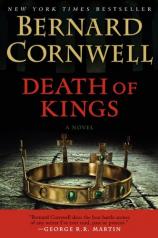Death of Kings
Review
Death of Kings
Bernard Cornwell’s Saxon Tales teach us that fate is inexorable and history is cruel. These forces shape not just our history, but our historical fiction as well. The newest volume is titled DEATH OF KINGS, and Cornwell has to deal not only with the inexorable historical fact of the death of Alfred the Great, but also with the cruelty of the loss of Alfred the Great as a character in his novel.
"Cornwell has to deal not only with the inexorable historical fact of the death of Alfred the Great, but also with the cruelty of the loss of Alfred the Great as a character in his novel.... Cornwell writes about battle with verve and attention to detail..."
It might have been one thing if Alfred had died in battle. Cornwell’s books thrive on battles, whether in pre-Norman England or Napoleonic Spain or the ragged edges of empires. But here, Alfred dies at home --- of sickness and old age --- and DEATH OF KINGS is largely the story of the continuation of his kingdom. The new king must face an ascendant church bureaucracy, family rivals, and the constant threat of Danish invasion. In order to do that, he has to have a war leader, someone of unrivaled courage and cunning, a threat to his enemies and all who dare oppose him in the shield wall of medieval battle. He must have Uhtred.
The love-hate relationship between Alfred the Great and the great warrior Uhtred had been the central axis of the Saxon Tales. Although Alfred is dead, Uhtred is still bound to his kingdom through bonds of loyalty, family and property. Uhtred dislikes and disrespects the priests who gather around Alfred in his last days --- not only because of his hostility to the Christian religion, but also because of their pious belief that the Danes can be defeated through prayer and missionary work. Uhtred knows that defeating the Danish threat will take swords, shields and the lives of the men who wield them, and he uses the lands and wealth gifted to him by Alfred to build up a core of loyal retainers.
History is kind to Uhtred in that the Danes do not immediately use the opportunity of Alfred’s death to attack his kingdom. This allows him to try his hand at chicanery by setting up a bogus fortune-telling operation to mislead the Danes and goad them into battle. This works a little too well, and the Danes land a large force in the east. Uhtred manages to block the Danish advance and set up a climactic battle, but the new king, Edward, listens to the counsel of his priests and delays until reinforcements are available.
It is the nature of this particular conflict that makes it all too obvious how much the death of Alfred impacts Cornwell’s narrative. The conflict between Uhtred and Alfred, and the inner conflict between loyalty and desire for Uhtred, has been a hallmark of the earlier books. Here, the conflict is diminished, partly because Edward is a much less interesting character, and partly because Uhtred’s allegiance to him is more secure.
Eventually, the Danish forces coalesce, and Uhtred is able to draw his forces together to face them. Cornwell writes about battle with verve and attention to detail, and here he lets Uhtred glory in the joy of slaughter while taking on a whole raft of enemies and traitors.
DEATH OF KINGS is not the conclusion of the Saxon Tales, but part of the saga ends here, and it’s a tremendous loss to see Alfred the Great slip away into history. But no king’s reign is forever, and no peace is permanent. Cornwell’s Wessex will remain besieged by enemies and will need Uhtred in the breach, wielding his long sword and short dagger, to fend off the forces that would destroy it.
Reviewed by Curtis Edmonds on January 19, 2012
Death of Kings
- Publication Date: August 28, 2012
- Genres: Fiction, Historical Fiction
- Paperback: 336 pages
- Publisher: Harper Paperbacks
- ISBN-10: 0061969664
- ISBN-13: 9780061969669





